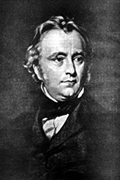Macaulay, Thomas Babington
Macaulay, Thomas Babington (1800-1859) first Baron of Rothley, British parliament member, Fellow of Trinity College (Cambridge), regular contributor to the Edinburgh Review, jurist, Commissioner and Secretary of the board of control (1832), and British Cabinet member (1839-41). Macaulay was made the baron of Rothley in 1854. His celebrity in British politics and literature is affirmed by his final rest at Westminister Abbey. In contemporary Europe Lord Macaulay was well known as an outstanding intellectual of the liberal school and an eminent historian. Most notable among his historical works are History of England (1839), Laws of Ancient Rome (1842), and History, 4 vols (1855). His collected works run into many volumes.

In South Asian history, Lord Macaulay is particularly known for the crucial roles he had played in shaping the educational policy for India and in framing the Indian Criminal Code. He served as a Law Member of the Governor General's Council from 1834 to 1838. From the 1820s, there was an ongoing debate concerning educational policy among the policy makers of the company government. They were arguing among themselves as to whether in British India the traditional system of education should be supported by the government or any alternative method on western lines introduced.
The participants in the debate became sharply divided into two camps, anglicists and orientalists. The anglicists were in favour of imparting western education in English while the orientalists were arguing in favour of oriental education in the vernaculars. Macaulay led the anglicist group and carried the Council with him in making English the official language and in introducing western education in English. His long and decisive minute countering the arguments of Prinsep, the leader of the orientalists, is not only an important historical document but also a piece of great literary value. In its rhetoric, the document is comparable to the speeches of Edmund Burke on Indian affairs in the House of Commons.
The contrast is that Burke's rhetorics were directed against the company and its servants and those of Macaulay against the people and institutions of India.
As chairman of the Law Commission, Macaulay made valuable contributions to the codification of criminal law for India. His Criminal Code Report is a monumental work in which he demonstrated his liberalism and great juristic insight. But unfortunately, in his minutes on the codification and westernisation of criminal law, he made many derogatory remarks about the national character of the Bengalis and of other Indians, which were not at all relevant to the codification. He said that the Bengalis were physically fragile and moral cowards. He branded them habitual liars, evaders, connivers and frauds. He tried to explain the 'dehumanised national character' of the Bengalis in terms of the despotism that they had been suffering for centuries. In accordance with the current fashion, among free traders and liberal intellectuals, of looking at company rule in India negatively, Macaulay also often criticised the despotism and corruption of the company government, but unlike others he also found great merit in the company administration. In his essays on robert clive and warren hastings, Macaulay criticised many of their actions, but eventually accepted them as torch bearers of European civilisation. He was in accord with those who considered company rule in India as a civilising influence.
Though a liberal and an intellectual of a very high order, Macaulay failed to comprehend the problems of the Indians under British rule. Ignorant as he was of Indian languages and institutions and unacquainted with the problems of the general people of the country, his scathing remarks about the character of the Indians tended to be populist and chauvinistic. In spite of his great intellectual attainments, he could not rise above the racist attitude to non-European cultures. Ironically, today Macaulay is mentioned by South Asian scholars not so much for his great contribution to the development of the Indian Penal Code but for his negative attitude to oriental languages and cultures, an attitude that lacked understanding and sensibility. [Sirajul Islam]
